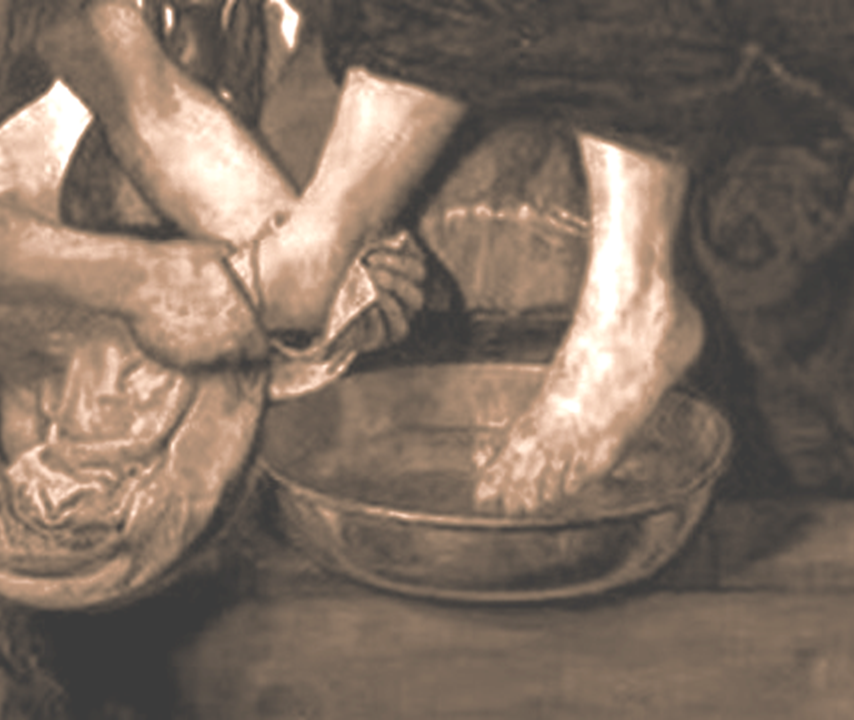Sermon: On Mary, Baptism, and Faith that Calls for Change
- Pastor Serena Rice

- Aug 23, 2021
- 5 min read

A sermon on Luke 1:46-55
[for an audio recording of this sermon, click here. Photo by Priscilla Gyamfi on Unsplash]
Mary in August? Yes.
Her song of praise and prophecy about her pregnancy removed from the context of Christmas? Again, yes.
And not just because the powers that be decreed that August 15th should be the Feast Day of Mary, but because she has something to teach us that is relevant year-round.
In her insightful essay on Virgin Mary, Mother of God, Kathleen Norris shares a sweet and funny vignette about her then ten-year-old niece’s exasperation about depictions of Mary. Apparently, after seeing yet another image of Mary clothed in long, flowing robes, the curious girl asked, “Why don’t people ever show her as a normal person?”[1]
It’s one of those questions to which we can either offer a simple explanatory answer (“well, you see, the historical Mary…”), OR we can submit to its eye-opening challenge.
Why DO we so often hold Mary at a distance, removed from any point of connection to our normal lives, painting her in pale pastels and beatific serenity, rather than letting her be overwhelmed, or stunned, or even excited by all that she experiences?
In other words, why do we separate her from our humanity, either by venerating her as the next thing to the Trinity, or relegating her to a few weeks in Advent and Christmas, as though she were irrelevant to the rest of our faith lives?
Or, perhaps more important than asking “why,” we should ask what do we lose by distancing ourselves from Mary as an inspiring, but still relatable, guide on our journey of faith?
Because that’s what we need, right? We don’t need a remote and unapproachable figure to adore. We need someone whose witness connects to our mundane lives, and to our own overwhelming challenges.
We need someone who not only encounters God herself, but who can draw us into the kind of encounter with the immanent, incarnate God that changes us.
After all, change is the fundamental center of Mary’s testimony, or at least Mary witnesses to the way that the unchanging God changes us.
Her song features a rhythm of reversal, wherein high and low are repeatedly leveled out in order to correct the imbalances of injustice.
And behind this theme is the deeper shift of the poem’s focus from the personal to the universal, revealing the recognition that is central to Mary’s experience:
when God shows up in our lives everything shifts – not just for us, but also for the way we interact with world around us.
When we experience God drawing near to us, we are also drawn near to the way that God has always embraced the seemingly insignificant, and called it blessed.
And, so, with Mary as our guide, we have the chance to celebrate this history AND to recognize the way that it applies to us.
The first step on this path is to follow her lead into praise… for debatable blessings.
Mary magnifies the Lord for choosing her to be the mother of Jesus, a choice that opens her life to scandal, and danger, and deep grief… not the kinds of things we usually consider #blessed.
And yet, she interprets God’s action as a sign of favor, a calling through which she will be known and honored by all following generations.
It’s a perspective that is impossible to understand, unless we connect it to what comes after: Mary’s telling of the on-going pattern of salvation history.
A history in which the God of strength and mercy works to consistently reorient a world out-of-balance.
God’s strength topples those focused on their own power and privilege at the expense of others.
And God’s mercy raises up the hungry and lowly whose needs have been ignored.
And this pattern explains Mary’s unconventional understanding of blessing, because she knows that God is not in the business of personal advantage. When God reaches into our lives, it is not just to boost our own happiness and security.
Rather, God blesses us by reorienting us. By teaching us to turn away from selfish concerns and to see our place in the larger world that God is working to heal.
Mary knows that the greatest blessing we can experience is to get to be part of that healing.
This same understanding is reflected in the baptismal promises that we will hear in a few minutes, when Christina and Chris bring baby Leo to the font to receive God’s gift of baptism.
In the Lutheran tradition, the sacrament calls on the parents, sponsors, and congregation to provide the foundation of faith through which God calls the baby into a life of salvation, and so – while it is God who provides the grace – the sacrament asks us all to make promises.
Specifically, Leo’s parents will promise to do a number of things, like living among God’s faithful people, bringing him to the Word and the Lord’s Supper, and nurturing him in prayer.
All of these promises focus on nurturing his personal faith (albeit doing so in community), but that’s not the end of the promises.
They go on to explain the reason why these activities are important.
“so that your child may learn to trust God,
proclaim Christ through word and deed,
care for others and the world God made,
and work for justice and peace.”[2]
In other words, from the very beginning of Leo’s faith journey, and in each and every one of our faith journeys, our faith is not just about our own connection with God.
It’s not just about the freedom of being forgiven for the ways that we fail God, and each other, and ourselves.
It’s not just for the joy of knowing and being known, loving and being loved by the Source of all Life.
It’s not just about personal blessing.
It’s about the way our faith forms us to be part of God’s healing work in the world, by caring for others and for all of creation; by working for justice and peace.
It’s about the same fundamental truth that Mary understood when she became the conduit for God’s incarnation in the world: we experience God’s grace when we participate in it.
It’s an inspiring vision of the life of faith, but that doesn’t make it easy or automatic.
If we were to answer the “why” questions I posed at the beginning of this sermon, I imagine our answers would include the confession that it’s much more comfortable to venerate Mary (or mostly ignore her) than it is to relate to her.
That way we don’t have to claim her definition of blessing for ourselves.
We don’t have to compare our small visions of how God wants to work in our lives, to her sweeping prophecy about re-balancing all that is broken in human systems and societies.
But the Magnificat is not only a song for Mary to sing. It calls to all of us to recognize the meaning of God’s incarnation in human flesh.
As commentator Judith Jones describes: “Mary sings about the God who saves not just souls, but embodied people. The God she celebrates is not content merely to point people toward heaven; God’s redemptive work begins here on earth.”[3]
And if that is true for Mary’s encounter with the incarnate God, then it is true for us as well. We are called to sing the same song.
While COVID makes it unsafe for us to physically sing when we are gathered together, our Sending Song today will give us the chance to sing such a song in our hearts.
The Canticle of the Turning is a hymn inspired by the Magnificat that calls us to celebrate the kind of world-healing change that Mary rejoiced to participate in.
And it gives us a chance to practice the courage and confidence to follow where she leads: embracing the call of a faith that is not only for our benefit, but is for the healing of the world.
Thanks be to God.
[1] Kathleen Norris, Amazing Grace: A Vocabulary of Faith, New York: Riverhead Books, 1998, p. 119. [2] Rite of the sacrament of baptism, Evangelical Lutheran Worship. [3] https://www.workingpreacher.org/commentaries/revised-common-lectionary/fourth-sunday-of-advent-3/commentary-on-luke-146-55.



























